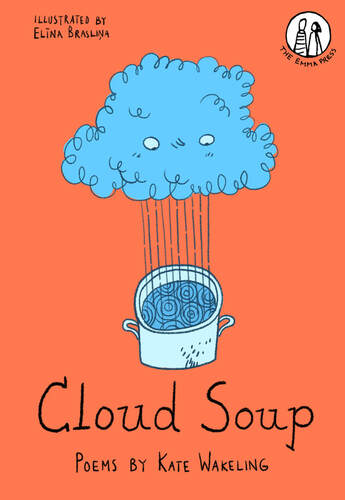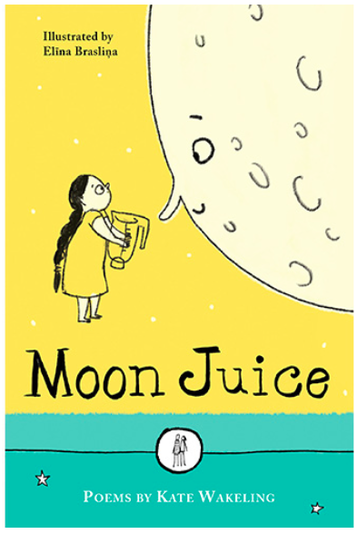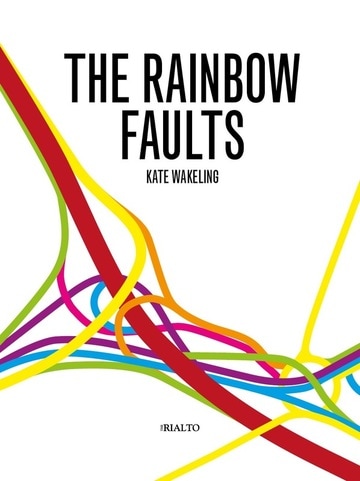
Cloud Soup is Kate's second collection of poems for children. It is published by the Emma Press, with illustrations by Elīna Brasliņa. It was selected as a Book of the Month in The Guardian and The Scotsman, and shortlisted for the 2022 CLiPPA.
'From the CLiPPA-winning Kate Wakeling comes a second volume of poetry, Cloud Soup, illustrated by Elīna Brasliņa with squiggly, cheerful charm. Both limpidly welcoming and profoundly meaningful, some of these poems, on subjects from weird cakes to good ideas, bodies, dust and Antarctica, will surely stay with their enthralled readers for ever.' – Imogen Russell Williams, The Guardian
'She is eloquent and thoughtful and, without striving for effect or reaching for the rhetorical flourish, moves effortlessly from the humdrum to the magical, the everyday to the universal. She is restlessly curious and, quick with a joke, knows when to keep it serious. And she treats her audience seriously, never playing up or down... This is the poet not as show-off entertainer or all-wise seer but as an exemplar, an enviably eloquent and subtle facilitator, who seems to be saying: this is my story, what is yours?' – Clive Barnes, Books for Keeps
'This is a poet at the height of her powers whose love of language and rhythms combine to dazzling effect... This collection has everything – poems to get discussion flowing, poems just to love for the sound of the words, poems to inspire writing. It is the best kind of book.' – Sam Keeley, Just Imagine
'A delightful collection of poetry and the sequel to her CLiPPA Prize-winning debut Moon Juice. Uplifting and thought-provoking, poems such as “The Water in the Glass You are Holding Right Now” encourage us to think about the interconnectivity of the natural world, while the cleverly written “The Poem Says No” and “Weird Cake” should raise a smile.' – Hannah Sycamore, The Scotsman
'From the CLiPPA-winning Kate Wakeling comes a second volume of poetry, Cloud Soup, illustrated by Elīna Brasliņa with squiggly, cheerful charm. Both limpidly welcoming and profoundly meaningful, some of these poems, on subjects from weird cakes to good ideas, bodies, dust and Antarctica, will surely stay with their enthralled readers for ever.' – Imogen Russell Williams, The Guardian
'She is eloquent and thoughtful and, without striving for effect or reaching for the rhetorical flourish, moves effortlessly from the humdrum to the magical, the everyday to the universal. She is restlessly curious and, quick with a joke, knows when to keep it serious. And she treats her audience seriously, never playing up or down... This is the poet not as show-off entertainer or all-wise seer but as an exemplar, an enviably eloquent and subtle facilitator, who seems to be saying: this is my story, what is yours?' – Clive Barnes, Books for Keeps
'This is a poet at the height of her powers whose love of language and rhythms combine to dazzling effect... This collection has everything – poems to get discussion flowing, poems just to love for the sound of the words, poems to inspire writing. It is the best kind of book.' – Sam Keeley, Just Imagine
'A delightful collection of poetry and the sequel to her CLiPPA Prize-winning debut Moon Juice. Uplifting and thought-provoking, poems such as “The Water in the Glass You are Holding Right Now” encourage us to think about the interconnectivity of the natural world, while the cleverly written “The Poem Says No” and “Weird Cake” should raise a smile.' – Hannah Sycamore, The Scotsman

Moon Juice is a collection of poems for children published by the Emma Press, with illustrations by Elīna Brasliņa. It won the CLiPPA 2017 and was nominated for the 2018 Carnegie Medal.
'This clever, funny, inspiring poetry collection, which has just won the CLiPPA, is a children's debut by a poet for adults, full of rich ideas and roll-around-the-tongue sounds that demand to be read aloud.' – Nicolette Jones, The Sunday Times
‘The musicologist Kate Wakeling, meanwhile, whose collection Moon Juice, from the Emma Press, illustrated with spiky charm by Elīna Brasliņa, won the 2017 CLiPPA, ranges from dreamy celestial meditation (“Moon is / silver sliver. // Moon is / clipped cup / from which to sip / a first drop / of freshly-pressed / moon juice”) to comet-streaking speed – “Comet” comes with the injunction that it should be read as fast as possible, ideally in a single breath.’ – Imogen Russell Williams, The Times Literary Supplement
'These are not poems created to grab the attention with the quick laugh and a lot of noise; these are poems to seduce, to attract because they reflect the imagination of the young reader... These are no cosily romantic lyrics but original works vividly capturing thoughts, ideas, musings and pinning them precisely to the page.' – Ferelith Hordon, Books for Keeps
'Exuding a belief that young readers are curious about the world they live in, Kate Wakeling’s poems also give her audience a sense of power, of being able to navigate the world they (we) live in... This wonderful collection is full of encouragement and interest.' – Zoe Toft, Playing By The Book
'I very much liked Wakeling's inventiveness and imagination... The language and content of the poems is slap bang up to date and all the better for it. The poems are varied in shape and form, there is bold use of white space and a sense of enjoyment in the language.' Carole Bromley, The North
'This clever, funny, inspiring poetry collection, which has just won the CLiPPA, is a children's debut by a poet for adults, full of rich ideas and roll-around-the-tongue sounds that demand to be read aloud.' – Nicolette Jones, The Sunday Times
‘The musicologist Kate Wakeling, meanwhile, whose collection Moon Juice, from the Emma Press, illustrated with spiky charm by Elīna Brasliņa, won the 2017 CLiPPA, ranges from dreamy celestial meditation (“Moon is / silver sliver. // Moon is / clipped cup / from which to sip / a first drop / of freshly-pressed / moon juice”) to comet-streaking speed – “Comet” comes with the injunction that it should be read as fast as possible, ideally in a single breath.’ – Imogen Russell Williams, The Times Literary Supplement
'These are not poems created to grab the attention with the quick laugh and a lot of noise; these are poems to seduce, to attract because they reflect the imagination of the young reader... These are no cosily romantic lyrics but original works vividly capturing thoughts, ideas, musings and pinning them precisely to the page.' – Ferelith Hordon, Books for Keeps
'Exuding a belief that young readers are curious about the world they live in, Kate Wakeling’s poems also give her audience a sense of power, of being able to navigate the world they (we) live in... This wonderful collection is full of encouragement and interest.' – Zoe Toft, Playing By The Book
'I very much liked Wakeling's inventiveness and imagination... The language and content of the poems is slap bang up to date and all the better for it. The poems are varied in shape and form, there is bold use of white space and a sense of enjoyment in the language.' Carole Bromley, The North

The Rainbow Faults is No. 10 in The Rialto's Bridge Pamphlets series.
'What grabs me about this pamphlet is how precisely and how playfully Kate Wakeling places words to construct soundscapes. These in turn create a space for her gifts of intellect and observation.' – Helen Evans, Sphinx Reviews
'Kate Wakeling is a poet to watch, her work an April rainbow of freshness and surprise.' – Carol Rumens, The Guardian
'Perhaps Wakeling’s greatest strength in this collection is distilling the folkloric, the magical and curious into an entirely clear, modern, exciting register... Wakeling’s work is full of interest, beauty and a faint sense of unease. It is dark as unlit woodland, but her mastery of sonic patterning and tight structure means that it is also delicious, irresistibly readable.' – Alice Tarbuck, Sabotage Reviews
'The poems in her debut pamphlet, The Rainbow Faults (a to-die-for title, btw) are muscular, technical and highly musical... I didn’t just enjoy these poems, I tasted, relished and devoured them... To read them is a quicksilver zip through language and Wakeling should be congratulated for putting together such an assured, bravura body of work.' – Richard Skinner, The Next Review